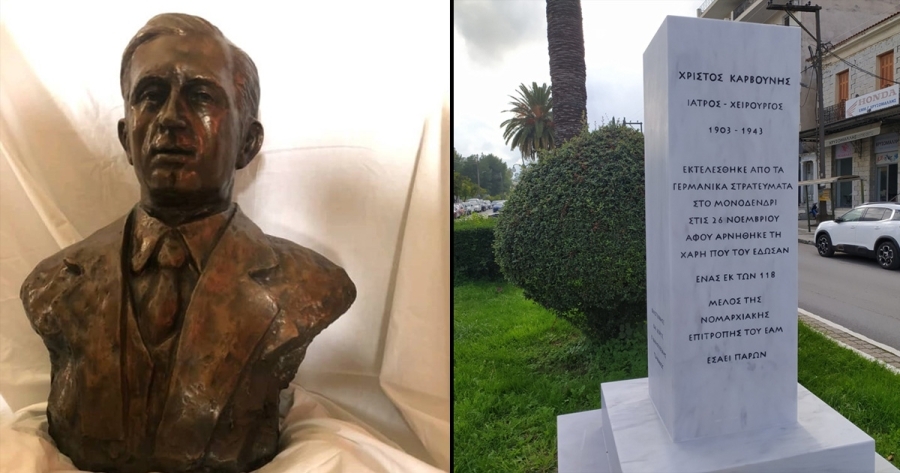
Doctor of History, Université catholique de Louvain-la-Neuve
The Municipal Council of Sparti has unanimously decided to erect a monument in honour of Dr Christos Karvounis, the Spartan physician and hero who was among the 118 distinguished sons of the city executed by the German Nazi occupiers on 26 November 1943 at Monodendri.
This act reflects great credit upon the Council. By erecting the bust of Karvounis, crafted by the Spartan sculptor Dimosthenis Tzanakos, in a prominent location upon a marble pedestal, accompanied by a properly documented historical inscription, without alteration or omission, the Council offers to the people of Sparti, to Greece, and to the wider world a contemporary example of patriotism, integrity and humanity, worthy of Sparti’s Leonidean legacy.
It was much the same in 1943, when the radio stations of the Allied nations in the Middle East broadcast across the world the news of the execution of the 118 heroes by the German Nazis.
Christos Karvounis, fluent in German, declined the offer of exemption from the firing squad. With the nobility of his spirit shining through, he asked instead that the youngest of the four Tsivanopoulos brothers be spared. This, too, Hitler’s forces refused. Who can fathom the anguish of their grief-stricken mother, another “Mad Mother” in the sense of Solomos, who, for a long time afterwards, would each morning and evening lay out and fold away her sons’ beds as though they were still alive?
It is worth recalling the most credible historical testimony, that of K. A. Glentis, a theology teacher in Sparti from 1939 to 1946 (2nd ed., Athens 1979, p. 69). Glentis was an ear-witness to a German non-commissioned officer and aide to the Garrison Commander, who, on the very day the 118 were buried, confided the following to him while living in the requisitioned room of Glentis’s home:
“The Doctor—a great patriot. Germany granted him his life, the General said. He refused. One child from four brothers, he said, let him live. No, the German officer replied. This old man then, said the Doctor. Not him either, said the German. Then the Doctor cursed Germany and the Germans, and they shot him down in the face with machine-guns.”
Glentis adds: “My wife and I heard these words from the German himself, accompanied by gestures to help us understand, though in a distorted form.”
All credible historical sources confirm that Karvounis was indeed a member of the National Liberation Front (EAM) and served on the Prefectural Committee of Laconia. To omit this from the inscription would be a grave insult to historical memory. After all, Greek society and the Greek State, after 1974, definitively closed the door on division and the civil-war hostilities perpetuated by the dictatorship of 1967–1974, years that inflicted deep wounds on our country. The restoration of democratic freedoms in the Constitution of 1975, and more than fifty years of stable democratic life since then, affirmed this path. So did Law 1285/1982, recognising the National Resistance against the Occupation (1941–1944), and Law 1863/1989, lifting the legacy of the Civil War in the spirit of National Reconciliation.
Similarly, the statues of the heroic Spartan Hero Konstantopoulou, murdered for her resistance activity by the blood-stained agents of Nazism and commemorated today in Ilioupoli and Piraeus, record in both cases that she was a member of EPON, the youth organisation of EAM. And it is an honour to Sparti that its First Primary School bears her name.
In moments such as these, poetry, art at its highest, cannot but be present. From C. P. Cavafy’s “Thermopylae”:
Honour to those who in their lives
set out and guard their own Thermopylae.
Never swerving from duty;
just and upright in all their deeds,
yet with compassion and with pity;
generous when fortune favours them, and,
when they are poor, still a little generous,
still helping as much as they are able;
always speaking the truth,
yet without hatred for those who lie.
And greater honour still is due to them
when they foresee (and many foresee)
that Ephialtes will appear at last,
and the Medes will finally break through.

No comments:
Post a Comment